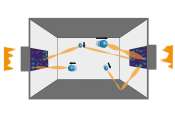New compact atomic clock design uses cold atoms to boost precision
(Phys.org) —Physicists at the National Institute of Standards and Technology (NIST) have demonstrated a compact atomic clock design that relies on cold rubidium atoms instead of the usual hot atoms, a switch that promises ...








